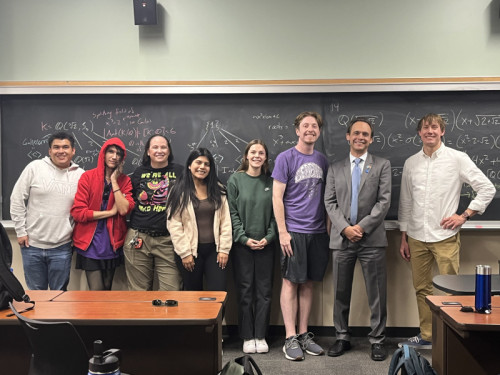 CEO’s Classroom Experience, Family Legacy Fuel $10M Gift For Hunter HallGreg Hunter never wears a suit to his abstract algebra class at Cal State San Marcos. So when he walked in dressed up one evening, his classmates teased him for being “all dolled up.” Few would guess that he is the CEO of Hunter Industries, a global organization and the largest private employer in San Marcos – or that the company is also a longtime philanthropic partner to CSUSM and is recognized on the campus founders’ seal. To them, he’s just Greg, a student who slips into class with the ease that comes from sharing four semesters with his classmates. “Greg is effortlessly humble, which is so refreshing,” fellow student Travis Bourdon said. “We knew he was a professional but had no idea of the scope. He fits right in, has made friends and encourages us to think about complex concepts differently.” A lifelong learner and Cornell University graduate, Hunter enrolled at CSUSM to challenge himself and strengthen his analytical skills. But the experience quickly became something more as he found himself inspired and motivated by the students around him. “Their grit, backgrounds and excellence impress me, as does the passion and engagement of the faculty,” Hunter said. “CSUSM is a special place with a clear commitment to advancing social mobility and student success across the region. It means a great deal to continue my family’s legacy of support.” This experience, combined with the family’s longstanding commitment to CSUSM, inspired a transformational $10 million gift to fund a new STEM facility. Recently approved by the CSU Board of Trustees, the building will be named Hunter Hall of Science and Engineering and is scheduled to open in fall 2027. Hunter Hall will boost engineering enrollment from 500 to nearly 2,000 students, strengthen the region’s workforce pipeline and support economic growth. “We are deeply grateful to the Hunter family and Hunter Industries for this extraordinary gift,” President Ellen Neufeldt said. “Greg’s experience in the classroom gives him a unique perspective on our students, many of whom are the first in their families to graduate from college. Hunter Hall will be a landmark addition to campus, providing state-of-the-art STEM facilities, fueling regional innovation and strengthening pathways for future graduates.” The Hunter family has helped shape CSUSM’s history for three generations – including Greg’s grandparents, parents and aunt, Ann Hunter-Wellborn, who served on CSUSM's University Council before the campus was founded and has continued to advocate for many student success programs. Over the years, Hunter Industries has supported several pivotal projects, including the Clarke Field House, University Student Union, Hunter Design Lab and state-of-the-art physics laboratories. The company also provides internships, mentorship and faculty support, and employs many CSUSM alumni. As for balancing coursework and running a global company, Greg approaches his studies with the same focus and dedication that define his leadership. “Greg is an exceptional student,” mathematics professor Hanson Smith said. “He even makes time for office hours, which is remarkable for someone who is also a CEO. Students are typically career-focused. Greg already has an extraordinary career, yet he’s here because he loves learning, which is likely what makes him such an effective leader.” With the Hunter gift, CSUSM’s “Blueprint for the Future” campaign – the university’s most ambitious fundraising effort – has raised nearly 80% of its $200 million goal. The campaign reflects the university’s continued growth and its commitment to advancing social mobility across the region. Explore Blueprint for the Future to see how CSUSM is different by design. Media Contact Eric Breier, Interim Assistant Director of Editorial and External Affairs ebreier@csusm.edu | Office: 760-750-7314
CEO’s Classroom Experience, Family Legacy Fuel $10M Gift For Hunter HallGreg Hunter never wears a suit to his abstract algebra class at Cal State San Marcos. So when he walked in dressed up one evening, his classmates teased him for being “all dolled up.” Few would guess that he is the CEO of Hunter Industries, a global organization and the largest private employer in San Marcos – or that the company is also a longtime philanthropic partner to CSUSM and is recognized on the campus founders’ seal. To them, he’s just Greg, a student who slips into class with the ease that comes from sharing four semesters with his classmates. “Greg is effortlessly humble, which is so refreshing,” fellow student Travis Bourdon said. “We knew he was a professional but had no idea of the scope. He fits right in, has made friends and encourages us to think about complex concepts differently.” A lifelong learner and Cornell University graduate, Hunter enrolled at CSUSM to challenge himself and strengthen his analytical skills. But the experience quickly became something more as he found himself inspired and motivated by the students around him. “Their grit, backgrounds and excellence impress me, as does the passion and engagement of the faculty,” Hunter said. “CSUSM is a special place with a clear commitment to advancing social mobility and student success across the region. It means a great deal to continue my family’s legacy of support.” This experience, combined with the family’s longstanding commitment to CSUSM, inspired a transformational $10 million gift to fund a new STEM facility. Recently approved by the CSU Board of Trustees, the building will be named Hunter Hall of Science and Engineering and is scheduled to open in fall 2027. Hunter Hall will boost engineering enrollment from 500 to nearly 2,000 students, strengthen the region’s workforce pipeline and support economic growth. “We are deeply grateful to the Hunter family and Hunter Industries for this extraordinary gift,” President Ellen Neufeldt said. “Greg’s experience in the classroom gives him a unique perspective on our students, many of whom are the first in their families to graduate from college. Hunter Hall will be a landmark addition to campus, providing state-of-the-art STEM facilities, fueling regional innovation and strengthening pathways for future graduates.” The Hunter family has helped shape CSUSM’s history for three generations – including Greg’s grandparents, parents and aunt, Ann Hunter-Wellborn, who served on CSUSM's University Council before the campus was founded and has continued to advocate for many student success programs. Over the years, Hunter Industries has supported several pivotal projects, including the Clarke Field House, University Student Union, Hunter Design Lab and state-of-the-art physics laboratories. The company also provides internships, mentorship and faculty support, and employs many CSUSM alumni. As for balancing coursework and running a global company, Greg approaches his studies with the same focus and dedication that define his leadership. “Greg is an exceptional student,” mathematics professor Hanson Smith said. “He even makes time for office hours, which is remarkable for someone who is also a CEO. Students are typically career-focused. Greg already has an extraordinary career, yet he’s here because he loves learning, which is likely what makes him such an effective leader.” With the Hunter gift, CSUSM’s “Blueprint for the Future” campaign – the university’s most ambitious fundraising effort – has raised nearly 80% of its $200 million goal. The campaign reflects the university’s continued growth and its commitment to advancing social mobility across the region. Explore Blueprint for the Future to see how CSUSM is different by design. Media Contact Eric Breier, Interim Assistant Director of Editorial and External Affairs ebreier@csusm.edu | Office: 760-750-7314 Finding Growth Through Patience, Campus InvolvementUnlike most children, Quetzalli Johnson wasn’t afraid of visiting the dentist. When she was growing up, her mother always made dentist trips a positive experience for Johnson and her brothers by offering them rewards for doing well in the office. Those positive childhood moments led Johnson to dream of working in health care and dentistry. Today, Johnson is one step closer to fulfilling that dream. “I’m so excited. I feel like the finish line is right there,” said Johnson, a fifth-year general biology major and pre-dental student who's graduating from Cal State San Marcos this month. “I’m really excited to navigate the world outside of school, spend time with my family and husband, and start working as a dental assistant during my gap year.” Along with a gap year to gain experience, Johnson plans to move to North Carolina with her family. She hopes to attend her top choice, the University of North Carolina, to study dentistry and become a dentist. Johnson was an active member of the Pre-Dental Society at CSUSM. She joined the campus organization in spring 2024 and became the social media officer during the 2024-25 academic year. Her efforts in the club helped her achieve the role of senior president this fall. “Being a part of that club taught me a lot about confidence and allowed me to be really comfortable speaking with other students,” she said. “I loved the leadership roles because of what they brought out in myself, and I loved being able to help and support others.” Not only did the Pre-Dental Society give Johnson a place where she belonged, but it also helped her understand the path to dental school. As club president, Johnson has tried to make clear to newer members that they should take their educational journey at their own pace. She often talks about her experience as a fifth-year student and how that extra time has benefited her academically. “I feel like a lot of members think they need to graduate within a certain time, because in high school that’s what we’re told,” Johnson said. “We’re told, ‘You have to graduate college in four years,’ and sometimes that can be a little discouraging. I think it's nice for the members to hear that I’m a fifth-year and see that I’m not defeated by it. I’m enjoying the ride.” Johnson also works hard to make the Pre-Dental Society a welcoming place for students. She encourages members to ask questions, informs them about volunteer opportunities and helps them connect with academic resources and see what lies ahead on the path to dentistry. Her passion for creating and fostering a loving environment is evident to her peers and professors. James Kezos, an assistant professor of biology, has worked closely with Johnson in the classroom and lab. “She is a very determined, hard-working and compassionate individual who has set high goals for herself,” Kezos said. “She is willing to learn and help with any task, showing exceptional levels of initiative and dedication. She excels at whatever responsibilities she undertakes, including her classwork, her research and her extracurriculars such as being president of the Pre-Dental Society.” In the Fly Lab with Kezos, Johnson began studying the physiological adaptations to chronic high-sugar diets in Drosophila (fruit flies) and how these diets affect their heart health and lifespan. Johnson explained that because Drosophila share many genetic traits with humans and have such a short lifespan, they’re ideal subjects for biological study. Alongside the study on high-sugar diets, Johnson has analyzed the Hedgehog signaling pathway in Drosophila heart function. “If we’re discovering new things that could help someone else’s future research, if it could be applied in any way and help the human population, I think that’s really neat,” Johnson said. “I love that we’re taking steps forward to potentially help people. That’s what I want to do in my future, help people.” As the Fly Lab’s sole data analyst, Johnson works closely with the flies’ heartbeats – noting that, in some cases, the flies have a fluorescent heart – by watching videos and turning that information into data through programs like Microsoft Excel. “The biggest impact she has made has been her efforts in implementing a large statistical code to process and analyze our fly cardiac videos,” Kezos said. “Without her help, we would not be able to analyze any of our data, and probably would be struggling with fixing the code.” Creating the code was a challenge that Johnson felt confident in tackling. She had data analysis experience from EOS Fitness, where she worked as a data coordinator. She also took a class on biological data analysis, so when Kezos mentioned that he had code that needed fixing, Johnson was quick to take on the project. It took Johnson roughly two months to go through the nearly 3,000 lines of code. She watched thousands of videos, quantified the data and made it possible for the lab to analyze all of their hard work. Johnson referred to the project as the ultimate puzzle. “It was so frustrating but also really rewarding,” she said. “That went beyond what I thought I was capable of, and just having the belief in myself that I could achieve that, it was such a rewarding feeling. It also strengthened my confidence in myself; I am capable of doing something like that. That was super empowering for me.” Johnson has used these new skills to teach other students in the lab how to use the code to analyze data. “Quetzalli has been an integral member of my lab, and has been a tremendous help in establishing the data analysis process,” Kezos said. “Without her efforts, initiative and care, we would not be as productive as we are today.” When looking back on her time at CSUSM, Johnson said her biggest advice for future students is to get involved. Transferring from Palomar College, Johnson thought she could handle everything on her own at CSUSM. She wasn’t thinking about joining clubs or finding community. But as she delved deeper into her coursework, she realized there was much she still needed to learn about the path ahead. She first heard about the Pre-Dental Society in a Biology 101 class, and the timing felt right. She decided to go to a meeting, and the organization ended up giving her the guidance and support she hadn’t realized she was missing. “I attended a meeting and thought, ‘This is so helpful,’ ” Johnson said. “Then, while I was at these meetings, I saw this community and the relationship between officers and members. I was like, ‘I really want to be a part of this,’ which was new for me. I had never felt like that before.” Being a member of the Pre-Dental Society and volunteering with the Fly Lab helped Johnson grow as a student. The knowledge she gained from both, combined with community support, helped her see how she could give back. Johnson’s newfound desire to get involved led her to participate in events such as the Student Poster Showcase. She presented a poster on the physiological responses to chronic high-sugar diets in Drosophila, the research she had done in the Fly Lab. “Get involved, because it doesn’t hurt; it only helps. You build such a great community and you learn so much. You’re able to meet like-minded people and grow as a human being,” she said. “Enjoy the ride. Enjoy where you’re at in the moment. Enjoy the people around you. Slow down and just enjoy where you’re at.” Media Contact Eric Breier, Interim Assistant Director of Editorial and External Affairs ebreier@csusm.edu | Office: 760-750-7314
Finding Growth Through Patience, Campus InvolvementUnlike most children, Quetzalli Johnson wasn’t afraid of visiting the dentist. When she was growing up, her mother always made dentist trips a positive experience for Johnson and her brothers by offering them rewards for doing well in the office. Those positive childhood moments led Johnson to dream of working in health care and dentistry. Today, Johnson is one step closer to fulfilling that dream. “I’m so excited. I feel like the finish line is right there,” said Johnson, a fifth-year general biology major and pre-dental student who's graduating from Cal State San Marcos this month. “I’m really excited to navigate the world outside of school, spend time with my family and husband, and start working as a dental assistant during my gap year.” Along with a gap year to gain experience, Johnson plans to move to North Carolina with her family. She hopes to attend her top choice, the University of North Carolina, to study dentistry and become a dentist. Johnson was an active member of the Pre-Dental Society at CSUSM. She joined the campus organization in spring 2024 and became the social media officer during the 2024-25 academic year. Her efforts in the club helped her achieve the role of senior president this fall. “Being a part of that club taught me a lot about confidence and allowed me to be really comfortable speaking with other students,” she said. “I loved the leadership roles because of what they brought out in myself, and I loved being able to help and support others.” Not only did the Pre-Dental Society give Johnson a place where she belonged, but it also helped her understand the path to dental school. As club president, Johnson has tried to make clear to newer members that they should take their educational journey at their own pace. She often talks about her experience as a fifth-year student and how that extra time has benefited her academically. “I feel like a lot of members think they need to graduate within a certain time, because in high school that’s what we’re told,” Johnson said. “We’re told, ‘You have to graduate college in four years,’ and sometimes that can be a little discouraging. I think it's nice for the members to hear that I’m a fifth-year and see that I’m not defeated by it. I’m enjoying the ride.” Johnson also works hard to make the Pre-Dental Society a welcoming place for students. She encourages members to ask questions, informs them about volunteer opportunities and helps them connect with academic resources and see what lies ahead on the path to dentistry. Her passion for creating and fostering a loving environment is evident to her peers and professors. James Kezos, an assistant professor of biology, has worked closely with Johnson in the classroom and lab. “She is a very determined, hard-working and compassionate individual who has set high goals for herself,” Kezos said. “She is willing to learn and help with any task, showing exceptional levels of initiative and dedication. She excels at whatever responsibilities she undertakes, including her classwork, her research and her extracurriculars such as being president of the Pre-Dental Society.” In the Fly Lab with Kezos, Johnson began studying the physiological adaptations to chronic high-sugar diets in Drosophila (fruit flies) and how these diets affect their heart health and lifespan. Johnson explained that because Drosophila share many genetic traits with humans and have such a short lifespan, they’re ideal subjects for biological study. Alongside the study on high-sugar diets, Johnson has analyzed the Hedgehog signaling pathway in Drosophila heart function. “If we’re discovering new things that could help someone else’s future research, if it could be applied in any way and help the human population, I think that’s really neat,” Johnson said. “I love that we’re taking steps forward to potentially help people. That’s what I want to do in my future, help people.” As the Fly Lab’s sole data analyst, Johnson works closely with the flies’ heartbeats – noting that, in some cases, the flies have a fluorescent heart – by watching videos and turning that information into data through programs like Microsoft Excel. “The biggest impact she has made has been her efforts in implementing a large statistical code to process and analyze our fly cardiac videos,” Kezos said. “Without her help, we would not be able to analyze any of our data, and probably would be struggling with fixing the code.” Creating the code was a challenge that Johnson felt confident in tackling. She had data analysis experience from EOS Fitness, where she worked as a data coordinator. She also took a class on biological data analysis, so when Kezos mentioned that he had code that needed fixing, Johnson was quick to take on the project. It took Johnson roughly two months to go through the nearly 3,000 lines of code. She watched thousands of videos, quantified the data and made it possible for the lab to analyze all of their hard work. Johnson referred to the project as the ultimate puzzle. “It was so frustrating but also really rewarding,” she said. “That went beyond what I thought I was capable of, and just having the belief in myself that I could achieve that, it was such a rewarding feeling. It also strengthened my confidence in myself; I am capable of doing something like that. That was super empowering for me.” Johnson has used these new skills to teach other students in the lab how to use the code to analyze data. “Quetzalli has been an integral member of my lab, and has been a tremendous help in establishing the data analysis process,” Kezos said. “Without her efforts, initiative and care, we would not be as productive as we are today.” When looking back on her time at CSUSM, Johnson said her biggest advice for future students is to get involved. Transferring from Palomar College, Johnson thought she could handle everything on her own at CSUSM. She wasn’t thinking about joining clubs or finding community. But as she delved deeper into her coursework, she realized there was much she still needed to learn about the path ahead. She first heard about the Pre-Dental Society in a Biology 101 class, and the timing felt right. She decided to go to a meeting, and the organization ended up giving her the guidance and support she hadn’t realized she was missing. “I attended a meeting and thought, ‘This is so helpful,’ ” Johnson said. “Then, while I was at these meetings, I saw this community and the relationship between officers and members. I was like, ‘I really want to be a part of this,’ which was new for me. I had never felt like that before.” Being a member of the Pre-Dental Society and volunteering with the Fly Lab helped Johnson grow as a student. The knowledge she gained from both, combined with community support, helped her see how she could give back. Johnson’s newfound desire to get involved led her to participate in events such as the Student Poster Showcase. She presented a poster on the physiological responses to chronic high-sugar diets in Drosophila, the research she had done in the Fly Lab. “Get involved, because it doesn’t hurt; it only helps. You build such a great community and you learn so much. You’re able to meet like-minded people and grow as a human being,” she said. “Enjoy the ride. Enjoy where you’re at in the moment. Enjoy the people around you. Slow down and just enjoy where you’re at.” Media Contact Eric Breier, Interim Assistant Director of Editorial and External Affairs ebreier@csusm.edu | Office: 760-750-7314
- Cancer Survivor Spreads Awareness Through LegosWhen asked why he wants to be a doctor, Cristian Alvizo would often answer, “Because I like science and I love to help people.” But there was always so much more hidden behind that answer, including a diagnosis that altered Alvizo’s entire outlook on life. It wasn’t until he met one of his colleagues and mentors in a lab at Cal State San Marcos that Alvizo realized he needed to change his answer to that question. Alvizo was diagnosed with testicular cancer the day before his high school graduation. He attended a physical required for his high school golf team that didn’t thoroughly examine for testicular cancer. After his appointment, he felt the need to self-screen, and that’s when he noticed something was off. He requested another appointment – disguising it as an HPV vaccination so his parents wouldn’t worry – where he was advised to receive an ultrasound and meet with a urologist. After a month-and-a-half of anxiously waiting, Alvizo met with Jeffrey Zeitung, a urologist at the Scripps Clinic in La Jolla, who delivered devastating news: Alvizo had testicular cancer and needed an orchiectomy, which is the removal of one or both testicles. Alvizo remembers thinking: “I'm 18, I graduate tomorrow, my mom is in the waiting room, I was just told I have testicular cancer and now I have to get an orchiectomy next week. This is a lot at once.” But Zeitung made Alvizo feel comfortable in a very uncomfortable situation, assuring him that they would get through this diagnosis together. He guided Alvizo through the process, teaching him about the disease and comforting him with the knowledge that 99% of testicular cancer patients end up fine. “Seeing how my urologist comforted me during this time made me want the privilege to be in that same position for other patients as well,” Alvizo said. “It inspired me to move down the path of becoming a physician.” Since his diagnosis, Alvizo, who is graduating from CSUSM this month with a bachelor's degree in biology and a minor in Spanish, has involved himself in numerous opportunities to further his education and spread awareness for cancer patients. His biggest contribution has been the creation of a nonprofit organization called Bricks for Change. Started by Alvizo and a few friends, Bricks for Change aims to spread awareness for all types of cancer. “You usually hear about Breast Cancer Awareness Month, which is in October, and outside of that, maybe Childhood Cancer Awareness Month in September. But you don't often hear about the other ones, so our goal is to spread awareness for the cancers of every month,” Alvizo said. The nonprofit raises money to donate Lego sets to kids in the hospital with cancer. Since the organization launched in October 2024, it have donated 550 Lego sets ($9,000 total value) between Rady Children’s Hospital in San Diego and MemorialCare Miller Children's & Women's Hospital in Long Beach. Included in every child’s Lego set is a card that allows patients to share a photo of themselves with the set they built. The pictures are posted to the Bricks for Change Instagram page and website with clearance from the hospital. Alvizo plans to continue this organization for the rest of his life and is working toward making it a 501(c)(3) nonprofit to attract the involvement of larger companies and more funding. He also hopes to build connections with more hospitals as he begins medical school. This isn’t the only advocacy Alvizo has done for cancer awareness. He is heavily involved with the Testicular Cancer Awareness Foundation and ran his first marathon to raise money for testicular cancer awareness. Since then, he has found a passion for running and has completed seven marathons and 19 half-marathons for various charities. He has been asked to speak at the American Urological Association on behalf of the Testicular Cancer Awareness Foundation. Alvizo is finishing his last semester at CSUSM, where he has been a member of professor Julie Jameson’s biology lab since he was a senior in high school. After reaching out to her via email while in high school, Alvizo was invited to join her lab, in which they studied inflammation in the skin relating to various diseases like psoriasis and obesity. Alvizo co-published two scientific papers during his time in the lab and traveled with his lab colleagues to conferences to present their findings. Alvizo is also a STEM ambassador for CSUSM's Center for Research and Engagement in STEM Education (CRESE). Every week, CRESE ambassadors visit middle and elementary schools in the region to lead after-school programs and STEM-based projects to get kids interested in science. In addition, they staff a booth every March at Super STEM Saturday, which is where Alvizo first found his love for science as a middle schooler many years ago. Clinical experience is required to apply for medical school, so Alvizo has been interning at Palomar Hospital for the last two years as a weekly hospice volunteer. He has worked on both the ICU floor and in the emergency department, checking in on patients and providing them comfort. Alvizo also is in the process of obtaining his EMT license so he can transition into a paid clinical position during his gap year before medical school applications open in June 2026. Recently, Alvizo has had the opportunity to shadow Aditya Bagrodia, a urologist researching testicular cancer tumor markers in the blood at UC San Diego, as well as urologist Ramdev Konijeti, who works closely with Alvizo’s urologist at the Scripps Clinic. “It's been a privilege to have a full-circle moment where I'm at the same cancer center, in the exact same room I was diagnosed, but now I get to see it from the other way around. It's really surreal,” Alvizo said. So now, when asked why he wants to be a doctor, Alvizo isn’t hesitant to tell his story. He is reminded of words from a former lab colleague, Alex Gonzalez, who is also a cancer survivor: “Every cancer patient has their own story. Just even hearing a diagnosis of cancer is a big deal. But you have a way of advocating that a lot of other people don't because you are young and healthy. Your interest in becoming a doctor will go a long way for spreading the word about cancer awareness.” Which is exactly what Alvizo plans to do. Media Contact Eric Breier, Interim Assistant Director of Editorial and External Affairs ebreier@csusm.edu | Office: 760-750-7314
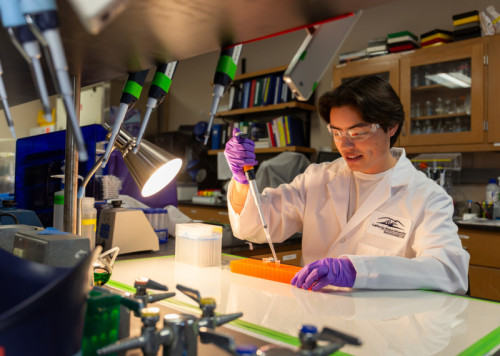
- Youth Lego Challenge Puts Archaeology Professor in DemandFor Jon Spenard, the start of this school year was hectic beyond the typical reasons – and beyond his wildest imagination. Spenard, you see, is an archaeology professor at Cal State San Marcos, and it was in about late August that archaeologists from around the world suddenly found themselves being bombarded with attention. As Spenard can attest, that’s not the normal reality for a scholar in his field. The reason for the surprising interest in archaeology? In August, the FIRST (For Inspiration and Recognition of Science and Technology) Lego League Challenge – an international competition for elementary and middle school students that attracts almost 700,000 kids – released its annual theme: “Unearthed.” As the website states: “Every artifact we uncover holds a story. Each tool, each innovation, each work of art connects us to the people and ideas that came before us. Using STEM skills and teamwork, today we can dig deeper into discoveries than ever before.” Almost overnight, Spenard was on speed dial. “No one was expecting this,” Spenard said. “Every archaeologist and museum I know was suddenly flooded with calls and messages requesting meetings.” So it was that on the afternoon of Nov. 24, Spenard met with a FIRST Lego League team named Bikini Bottom Brick Builders – three middle school girls from Temecula and their parents – in the Social and Behavioral Sciences Building. The team was trying to build a LiDAR scanner – an acronym for “Light Detection and Ranging,” LiDAR is a remote sensing method for creating 3D models of the real world – and Spenard talked to them about how the technology works, how it relates to archaeology and how they could use their newfound knowledge to make better scans. That consulting session was the latest of about a dozen that Spenard has conducted this semester – some on campus, some by email, some at a public archaeology event that he attended in October (Arch in the Park in San Diego). “The groups and their parents do deep research,” he said. “I think many found me through our departmental website.” Each year, the FIRST Lego League introduces schoolkids to a scientific and real-world challenge that will be the focus of their research. The competition involves designing and programming robot prototypes with Legos to complete tasks, and working out a solution to a problem related to the theme. The students meet for regional, national and international tournaments to compete, compare ideas and display their robots. Spenard’s assistance to teams in the region has run the gamut, from conveying the general nature of archaeology – hint: as he says, “it’s not dinosaurs!” – to listening to presentations to providing feedback on early design prototypes. Though wholly out of the blue, the experience has been a rewarding one for him. “My hope, more than anything, is that these kids have walked away with a much better understanding of what archaeology is and how it is done,” Spenard said. “My impression is that, collectively, these kids are doing amazing engineering work that will revolutionize the field of archaeology and many others someday.” Media Contact Brian Hiro, Communications Specialist bhiro@csusm.edu | Office: 760-750-7306
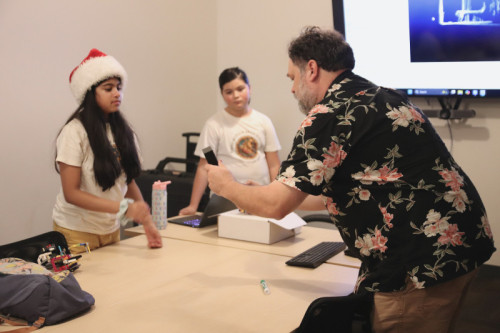
- Record-Breaking Giving Day Raises More Than $820KCal State San Marcos celebrated another record-breaking Giving Day this year, raising $828,397 from 2,444 gifts in just 24 hours. The total raised on Dec. 2 was $80,000 more than the previous record set last year. Giving Day is part of Giving Tuesday, an international day focused on philanthropy. The Giving Day highlights included: A number of matches were met, including $200,000 from the Epstein family, $10,000 from SchoolsFirst Federal Credit Union, $5,000 from North City and more than $100,000 in individual area frontline matches, benefiting 132 campus programs. 56 ambassadors brought in 329 gifts. Students made 318 gifts. Nearly one in five gifts came from alumni, who supported 119 programs, departments, colleges or scholarships. Every gift counts toward the university’s “Blueprint for the Future” fundraising campaign, the largest in CSUSM’s history. The campaign’s theme reflects both the physical growth on campus and the forward momentum building at CSUSM as one of the CSU system’s fastest-growing campuses. Founded in 1989, CSUSM serves 17,000 students and is proud to be ranked No. 1 in the nation for advancing social mobility. Media Contact Eric Breier, Interim Assistant Director of Editorial and External Affairs ebreier@csusm.edu | Office: 760-750-7314
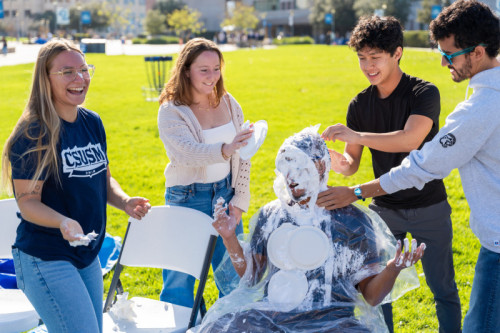
- Faculty and Staff Secure Funding Across DisciplinesFor education professor Rebecca Brooks, receiving $2.5 million in grants to expand the Aspiring Scholars program is a dream come true. “It’s incredibly meaningful to give students with intellectual disabilities an inclusive college experience,” Brooks said. “My greatest hope was to obtain funding to expand our cohort size and ensure the long-term sustainability of this program. These grants make that vision a reality.” Funding at this level is highly competitive nationwide, yet faculty and staff at CSUSM like Brooks continue to stand out, securing awards that support innovative projects and create transformational experiences for students. “Our faculty and staff are pursuing some of the most-sought-after grants in the nation, alongside leading institutions,” said Charles De Leone, dean of graduate studies and research. “It’s exciting to see their ideas recognized and to watch how their work enriches our students’ experiences, strengthens our campus and serves our broader community.” Examples of projects funded this academic year include: Supporting chemistry and biochemistry students: A $2 million grant from the National Science Foundation will fund student scholarships in chemistry and biochemistry as well as a Vertical Mentoring Learning Community (VMLC). Led by Robert Iafe, Afra Panahi and Aswad Allen, the program blends mentoring, research opportunities and priority enrollment for up to 30 students each year, with eight first-year students eligible for renewable $15,000 scholarships. Making exercise more accessible: Kinesiology professor Todd Astorino received a $442,590 grant from the National Institutes of Health (NIH) to explore how reduced exertion high-intensity interval training (REHIT) – two short 20-second sprints within a 10-minute workout – can improve health and make exercise more attainable for inactive adults. Expanding mobile making in local schools: Funded by the National Science Foundation, this project led by Edward Price, April Nelson and Sinem Siyahhan of the Center for Research and Engagement in STEM Education (CRESE) expands the university’s Mobile Making program. Through after-school “making” clubs across North County, undergraduate STEM ambassadors bring hands-on activities and equipment to schools, libraries and community centers. Helping students with intellectual disabilities experience college: Brooks and psychology professor Allison Jobin received $2.5 million in grants to expand Aspiring Scholars with full-time staff, a dedicated campus space and additional peer mentors. Adding water refill stations: A grant from CalRecycle will enable CSUSM to reach its goal to have a water refill station on every floor of every building. Led by Juliana Goodlaw-Morris, director of sustainability and climate justice, in partnership with Facilities Development & Management, this grant will fund 10 new water refill stations and replace five older stations across campus. The project’s progress will be measured through station usage, recycling volumes and waste audits. “Each of these projects reflect the spirit of innovation and collaboration at CSUSM,” De Leone said. “They also give students meaningful opportunities to engage in hands-on research that prepares them for their future careers.” Research funding is an integral part of CSUSM’s “Blueprint for the Future” campaign, helping advance the university’s $200 million goal through both philanthropy and grants. Media Contact Eric Breier, Interim Assistant Director of Editorial and External Affairs ebreier@csusm.edu | Office: 760-750-7314
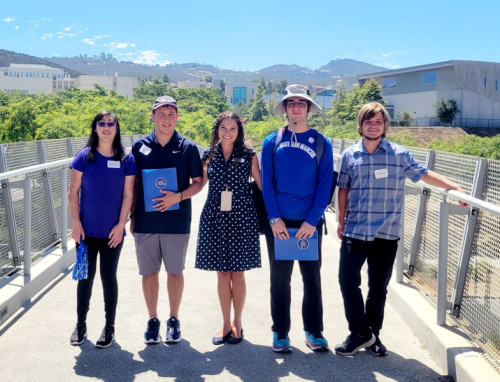
- Ohio University Fellows Join CSUSM Students for Collaborative Leadership SessionStudents from Cal State San Marcos had the chance to connect with students from Ohio University during a collaborative class session that highlighted shared experience, leadership and cross-campus engagement. The Center for Leadership Innovation and Mentorship Building (CLIMB) hosted the students from Ohio as part of its signature In the Executive’s Chair (ITEC) series. Rajnandini “Raj” Pillai, director of CLIMB and a professor of management, explained that the course brings students into direct conversation with influential leaders and creates meaningful opportunities for interaction with peers worldwide. “CLIMB always believes in collaborating with other entities on campus as well as other universities, both domestic and international, especially when it pertains to our speaker series for the community or our signature In the Executive’s Chair class,” Pillai said. The Nov. 4 visit included a joint class session featuring Jordan Marks, San Diego County assessor, as well as an informal conversation and lunch on campus. The Ohio University students spent the afternoon exchanging insights with CSUSM students about academics, career plans and student life. CLIMB was established in 2004 by CSUSM’s College of Business Administration, with the mission of fostering the development of effective leaders at the individual, team, organizational and community levels. The center focuses on promoting innovative leadership and research through educational programs and mentoring opportunities. The ITEC series brings high-level leaders from diverse industries to speak with students about topics such as communication, decision-making, ethics and professional development. Previous cohorts have included international participants, such as master’s students from Sweden who joined ITEC via Zoom. Ohio University students also visited CLIMB over the summer. During this visit, the Raymond A. Lancaster Executive Leadership Fellow, Dan Squiller, said the experience exceeded expectations. “The feedback from our students was uniformly positive,” Squiller said. “This first engagement and eating lunch on a sun-soaked CSUSM campus was the perfect way to kick off their week of sessions in San Diego. So, thank you for orchestrating our inclusion, handling the logistics and making us feel so welcome.” Pillai said she hopes to continue the partnership and host the leadership fellows annually, noting that opportunities like these enrich the classroom experience and strengthen CLIMB’s commitment to developing leaders through connection, conversation and community. CSUSM students also reflected on the value of the exchange. “Talking with the Ohio University students during class was a really interesting experience because it showed me how, even though we go to different schools, we share a lot of the same goals and challenges,” Lysandra Lyman said. “The main difference I noticed was in the size and culture of their school, which gave them different kinds of opportunities. But overall, it made me realize how much we all relate to each other when it comes to learning, growing and preparing for the future.” Media Contact Eric Breier, Interim Assistant Director of Editorial and External Affairs ebreier@csusm.edu | Office: 760-750-7314
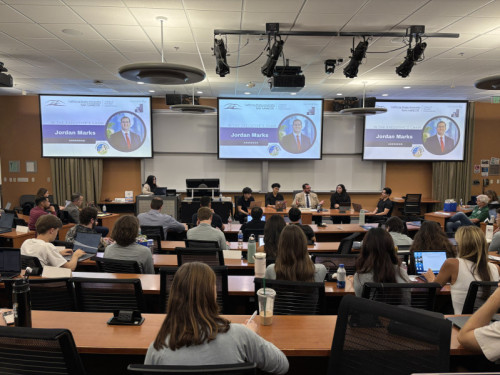
- Spanish Professor Makes Feature Film DebutUntil recently, Darci Strother’s acting career consisted entirely of playing the lead role of a hippopotamus in one play. This was in third grade. So imagine her surprise when director Antonio Muñoz de Mesa approached Strother – a Spanish professor in the Cal State San Marcos modern language studies department – about playing a significant role in his international revenge action film, “Santa Zeta.” “He wanted someone who looked fairly innocuous, kind of like a soccer mom,” said the 59-year-old Strother, who has taught at CSUSM since 1993. “He wanted someone to surprise the audience who looked like your everyday innocuous person who would actually be a villain.” The Spanish film wrapped in 2024 and recently hit the film festival circuit, which included winning the Award of Excellence in the feature film category at the third annual Santa Barbara Indie Film Festival in September. The film made its U.S. debut at the festival. CSUSM’s Global Commitment Committee will screen it as its featured film March 9 in the University Student Union. De Mesa has agreed to join the discussion for the screening, either in person or via Zoom. “Santa Zeta” was filmed in Spain and South Korea, with Strother’s scenes shot in San Marcos. Her scenes are listed as being filmed in Escondido because Escondido means “hidden” in Spanish, and it’s a play on words for the many hidden meanings within the movie. The film’s synopsis (from IMDb): “A super famous travel influencer, Santa Zeta, uses her social media as a cover to travel the world hunting pedophiles, obsessed with finding her little sister’s killer.” Strother plays the role of Amelia, a seemingly innocent woman with a sinister side. “I caught the bug of embracing other new challenges,” Strother said. “I think when you’re asked to do something difficult, you’re not sure if you can do it. And then you do it, and it turns out well. That gives you the confidence of, ‘Well, I wonder what’s next.’ ” Strother spoke on the panel after the Santa Barbara screening, which was attended by her family along with de Mesa, the production manager and other cast members. The film was the feature event Friday night for the weekend’s festivities. In addition to teaching and service, every CSUSM tenure-track faculty member must perform research and creative activity as part of their duties. For Strother, before 2024 that consisted of writing academic articles and books about 17th-century Spanish theater. What the film experience gave her was a new perspective on viewing the creative process of cinema. She said she was thrilled to be on the panel for a Q&A session after the debut screening so the audience could see her true personality. “I play a very unflattering character,” she said. “I play a character who does something evil, despicable things. It was kind of exhilarating. I was able to step outside of myself and say, ‘Oh wow, I really did that.’ It’s an accomplishment I achieved in life that lives there forever.” De Mesa has 48 credits to his name on IMDb, including actor, director, producer, writer and editor. As the director of “Santa Zeta," he knew immediately that he wanted Strother for the role despite her lack of acting experience. They had connected many times when Strother was presenting research in her area of expertise. “Although Darci didn't have experience as an actress working in films, I knew her for many years and was totally sure that she could perform this role with the help of an acting coach,” said de Mesa, who was born in Madrid. “I needed an actress for the role of Amelia with a calm, intelligent energy. That's why I thought of Darci right away. Her sensibility and closeness to the acting community made it super easy to work with her in her sequence.” The request from De Mesa came at what can only be called an inopportune time. Strother had just begun caring for her daughter, who was recovering from what Strother described as a serious surgery. In the same week, she also had been asked to moderate the Global Commitment Committee’s informal conversation with students leading up to the 2024 presidential election. She was acting as GCC’s interim chair. And she had been asked to substitute teach for a class of a subject she “really didn’t know.” “All of these things that came together made me actually feel weirdly relaxed because it felt like, OK, life is throwing me all these curveballs and opportunities, and I'm not expecting of myself to do anything more than what I can do,” Strother said. “I think if I had only done the film that week, I would have just been obsessing and worrying about it. Because there were so many things going on, I was taking things one step at a time – 'I'm going to do it,' and everyone in the cast and crew made me feel really relaxed.” Faculty in the College of Humanities, Arts, Behavioral and Social Sciences are often looking for new avenues to create and innovate – to go beyond the classroom to share experiences that inspire and introduce career paths beyond a straight line. Earlier this semester, Strother showed some still photographs from the film and pictures from the festival to her classes. She presented the images from the perspective of doing big things when you’re not expected to. Particularly when it comes to art, she wanted her students to understand that it’s never too late to take risks. Even a faculty member with decades of experience in academia can become a screen actor. “It was very unexpected, but I’m kind of at that point in my life where if someone asks me to do something and I don’t think I can do it, I say, ‘Sure, why not? I’ll try it anyway,' ” Strother said. “I might succeed, I might not succeed. I have the luxury of being at a point in my career where I can try new things and take risks.” Media Contact Eric Breier, Interim Assistant Director of Editorial and External Affairs ebreier@csusm.edu | Office: 760-750-7314

- Double Alumna Pays It ForwardGrowing up in Mira Loma, a rural community in Riverside County, double alumna Amy Barrera remembers cows and few examples of social mobility. “We never heard about people going to college,” said Barrera, who earned a bachelor's degree in human development in 2018 and a master's in public health in 2024. “If it weren’t for Upward Bound, I wouldn’t have known it was a possibility for me.” Through Upward Bound, a program that helps low-income and first-generation high school students prepare for college, Barrera received academic support, mentoring and help with applications. When Barrera arrived at Cal State San Marcos, she discovered a community that was both welcoming and unfamiliar. “I met an international student for the first time," she said. "Back home, everyone is Hispanic. It was so interesting to be in a place that celebrated diversity. The campus and the student life centers showed me that there’s a place for everyone.” After earning her bachelor’s, Barrera began working in health-related fields and discovered a passion for research. Returning to CSUSM for her master's helped her refine that passion and find belonging. “That’s when I really felt seen as a Mexican-American researcher,” Barrera said. Receiving a scholarship from the CSUSM Alumni Association was another milestone. “The money was helpful, but more importantly, being selected was super validating,” she said. Today, Barrera works at Pacific Lutheran University in Tacoma, Wash., and hopes to pursue a doctorate in public health. As an employee benefit, she was able to create a will and decided to include a $10,000 scholarship for public health students at CSUSM. “Making a will was so easy, a lot easier than I thought, and I’m extremely grateful to be in this position to give back,” Barrera said. Supporting students like her and the public health field is at the heart of Barrera's motivation to give. Asked what she’d tell future recipients of her scholarship, she doesn’t hesitate. “You received this scholarship for a reason," she said. "There are people out there who see your potential and have invested in it. Lean into that and trust your capabilities to do incredible things. Keep going!” How You Can Support Future Students in Your Estate Plan Barrera’s story is a powerful example of how anyone, at any age, can help future students thrive. Gifts in estate plans – through wills, trusts or retirement accounts – can be changed by the donor at any time, and there are many possible planned giving options to suit your needs. Gifts at all levels make a difference for students. “I want young people to know it’s easier than they think,” Barrera said. “Even with modest assets, you can still set up a planned gift. You don’t have to wait until later in life.” To learn more about planned gifts, contact P. Vien Walker, director of planned giving, at 760-750-8138 or vwalker@csusm.edu, or visit plannedgiving.csusm.edu. Media Contact Eric Breier, Interim Assistant Director of Editorial and External Affairs ebreier@csusm.edu | Office: 760-750-7314
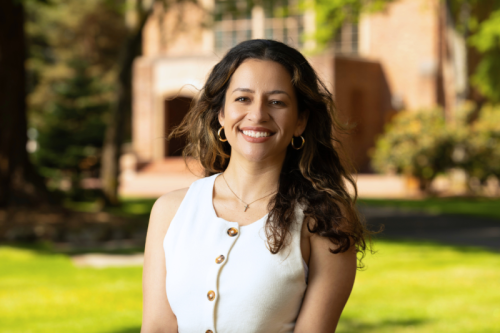
- Pawsitive Influence: Frank the Facility Dog Turns 3A member of the Cal State San Marcos family is about to celebrate a special birthday. Frank the Facility Dog will be turning 3 years old on Saturday. To celebrate, Frank had a special birthday party in the third-floor lobby of Kellogg Library on Thursday. Nearly 100 students came by to wish the party animal a happy birthday just before U-hour. Frank’s party included cupcakes and candy for the guests and photos with the birthday boy. He even received a special visit from the Cougar Care Network cart, a special birthday handkerchief and an outfit from some well-wishers. Frank, a goldendoodle, is a therapy and facility dog. According to his mom, Tracy Daly, a CSUSM kinesiology lecturer and registered dietitian/nutritionist and sports dietitian, he is a beloved member of her family. She said Frank’s presence is just the present CSUSM needs. “He is bringing a lot of joy to students who are struggling or stressed,” Daly said. “And not only students, but faculty, staff and administrators.” Just this semester, Daly said, Frank has completed more than 1,500 visits, supporting mental health and building community connections. Animal-assisted therapy has shown significant reductions in both psychological and physiological stress, a recent study found. “A lot of folks on this campus are away from home, and they might be missing their dog,” Daly said. “I’ve had a lot of students tell me they recently lost their dog or they’ve had loss in their family, and they come visit Frank and he’s just this warm, fuzzy ball of love.” Vera Lee, a junior nursing major, agreed. “I met Frank during a class Tracy was doing and started following him on Instagram,” Lee said. “Frank brings me a lot of joy and helps me during the stressful times. I see Frank three times a week, and I recommend that anyone who loves dogs or animals or who has pets they’re not able to see come by and visit Frank.” Frank is fully trained and certified as both a therapy and facility dog through Pawsitive Teams and Love on a Leash. His work aligns strongly with CSUSM’s values around well-being, belonging and student success. “What we found is that Frank has a very good demeanor when it comes to therapy work,” Daly said. “He passed his canine good citizen test with flying colors.” Frank was certified as a therapy dog in just eight weeks. His journey to CSUSM took more than a year – starting with the kinesiology department; working his way through to Integrated Risk Management; the Office of Safety, Health and Sustainability; all the way up to the provost. That journey was worth it, Daly said. “I see the changes in students’ faces when they come out and hang out with him,” she said. During the fall semester, people can come by and visit Frank on Mondays from 12:15-2:15 p.m. in front of Kellogg Library, on Tuesdays from 11:45 a.m. to 12:45 p.m. at the Epstein Family Veterans Center and on Thursdays from 11:30 a.m. to 12:45 p.m. in the library's third-floor lobby. Media Contact Brian Hiro, Communications Specialist bhiro@csusm.edu | Office: 760-750-7306
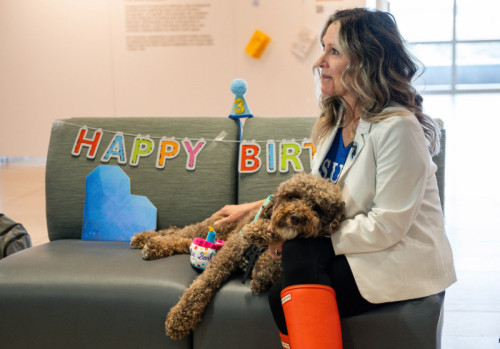
- Alumnus Returns to Nest as Head of New American Indian Student CenterJoely Proudfit arrived as a professor at Cal State San Marcos in 2008 – before she became chair of an American Indian studies department that then didn’t exist, before she founded an on-campus center devoted to California Indian culture and sovereignty. That fall, Proudfit taught a course called “Native American Communities.” It was a small class, featuring only about a dozen students. One of them stood out immediately. Proudfit had known the family of Tommy Devers for years. They are both Luiseño Indians, and Tommy’s uncle is Chris Devers, the former chairman of the Pauma Band of Luiseño Indians, who has deep ties to CSUSM. But that didn’t prepare her for what she would encounter in Tommy. “I noticed his commitment and curiosity right away, but what struck me more deeply was the way he carried himself in service to his community,” Proudfit said. “His hands were always in the work. He showed up for his people with a sincerity that you cannot teach. “There is simply a light to him. My husband used to joke that Tommy should be the mayor of whatever town he happened to live in because he is just that kind of person: engaged, grounded, generous and easy to gravitate toward.” After graduating from CSUSM with a degree in communication in 2009, Devers went on to complete a master’s program in sociological practice, bolstering his connection to the university. During that time, he further immersed himself in Native studies, and even helped Proudfit move into the new California Indian Culture and Sovereignty Center (CICSC). About a year ago, then, when a job as the first leader of a planned American Indian Student Center became available, Proudfit had the ideal candidate in mind. “Tommy,” she said, “was exactly the person we needed.” And Devers was exactly the person CSUSM got. Hired as assistant director in February, the double alumnus spent his first semester observing and developing relationships with American Indian and other students while working out of an office near Proudfit in the CICSC. By late August, he had moved into his new office in the student center, which occupies a suite in the University Student Union that formerly housed the Cross-Cultural Center. This fall, he has overseen five student employees while the American Indian Student Center welcomes in an average of about 20 students per day. Greeting them as they enter is an enormous, wall-sized mural painted by American Indian studies professor Eric Tippeconnic. To make the center more inviting, Devers and his team rebranded it as “The Nest,” both a nod to the center's logo of a feather and a nickname that rolls off the tongue more easily. “This is going to become the nest where students come, they get nurtured, they grow and then they move on in their journey,” Devers said. “So it took on a more symbolic meaning as well. “There's a lot of excitement from the students, and I think they have a strong desire to make this space their own. This is the foundational year. This is when we start being mindful of how we want the center to be, the legacy we want it to have.” The Nest represents the fulfillment of a desire Proudfit has held almost from the day she first stepped foot on campus to give CSUSM’s American Indian students a place they could call their own. Out of necessity, they have congregated over the years at the CICSC on the first floor of the Social and Behavioral Sciences Building. A door opened a couple of years ago when Viridiana Diaz, CSUSM’s vice president for Student Affairs, formed an advisory committee led by lecturer John Tippeconnic, whose report affirmed the need for a dedicated center. The timing lined up perfectly with the availability of Devers, who had moved back to California after some time living out of state and was ready to return to higher education. “He was raised for this kind of work,” Proudfit said. “He is thriving because the job aligns with his spirit, his community roots and his lived commitment to our students.” Devers grew up on the Pauma reservation as the youngest of four children of a Luiseño father and Irish mother. He recalls an idyllic childhood marked not only by normal pursuits such as abundant outdoor play in the rural landscape but also by a stint as an actor. As a fifth-grader, he attended a casting call, which led a trip to acting school, the hiring of an agent and, on his seventh audition, a role in the TV show “Power Rangers.” During middle school, he even moved to Los Angeles for a year with his mom to try acting full-time before concluding that the world of Hollywood was not for him. The sense of adolescent adventure, however, didn’t come without some discomfort related to his identity. “There's definitely some pain that came up because my mom is white and my dad is Indian,” Devers said. “Being half-white on the reservation, you're very aware of your situation at a young age.” After being part of one of the first graduating classes at Valley Center High School, Devers went to Palomar College along with his brother and one of his two sisters. It was a rather aimless period for him. He explored being a photography major. He contemplated becoming an English teacher. He took a semester off to travel, and ultimately stayed at the college for almost four years. “No one who I knew could explain to me what the next steps were,” he said. Devers found direction when he transferred to CSUSM in 2007, and particularly the following year when Proudfit joined the faculty. The American Indian studies discipline hadn’t been created yet, but he took as many classes in that vein as he could. After he earned his bachelor’s degree, Proudfit helped him land a job with the U.S. Census Bureau, for which he leveraged his tribal relationships and cultural knowledge to help boost participation by Native peoples in the 2010 census. The more Devers went down the path of connecting with his heritage, the farther he wanted to go. He began working for his tribe as a youth program coordinator. He came back to CSUSM to earn a master’s and resumed his leadership in the American Indian Student Alliance. “I realized that education was changing my life in a way I never imagined,” Devers said. “The subjects I was learning about were changing the way I thought about things and approached ideas.” Devers was in his second year of the master’s program when the CICSC opened in 2011. Proudfit remembers that it was Nov. 17, the same day she returned from maternity leave. While she was holding her 3-month-old daughter, Piper, Devers and an interior designer friend of Proudfit’s decorated the center in one day on a shoestring budget. “We filled the space with photos of our students and tribal community members, and much of what they created that day still lives in the center now,” Proudfit said. “Tommy has been integral to the CICSC from day one. His labor, his vision, his spirit are all woven into the roots of that space, and I remain deeply grateful.” Fourteen years later, now married with two young children, Devers is integral to a new space for American Indian students. Following a first year in the job aimed at establishing The Nest and making students feel at home, he plans to turn his focus to career pipelines and recruitment. To that end, he’s the lead organizer for the 2026 edition of Dream the Impossible, a Native youth conference that has been held for nearly two decades and is returning to CSUSM in April. More than 500 Native middle and high school students will converge on campus for an event that will introduce them to Native professionals in various fields and tout the transformative power of higher education. Devers knows a thing or two about that. “I have such hope for what this university is becoming,” he said. “The knowledge and kinship that can be gained through American Indian studies, the CICSC, the American Indian Student Alliance and The Nest can have a massive impact in tribal communities. That's what excites me the most. We're developing students who will lead our tribal communities into a future rooted in sovereignty, accountability and cultural strength." Media Contact Brian Hiro, Communications Specialist bhiro@csusm.edu | Office: 760-750-7306
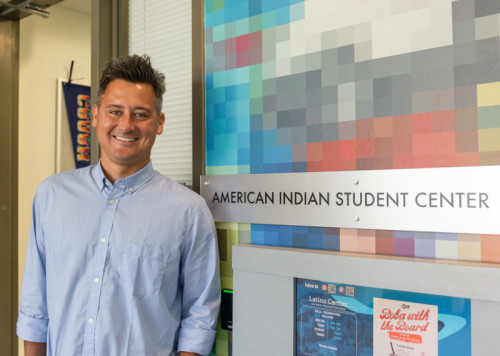
- CSU Economic Impact Report Highlights CSUSM's Vital RoleThe California State University system released its economic impact report today, highlighting the significant role that the CSU and Cal State San Marcos play in driving regional economic vitality, strengthening key industries and preparing a skilled workforce essential to the economy. “The CSU and Cal State San Marcos continue to be among the state’s most powerful engines of economic mobility, opportunity and innovation as their influence extends across industries, communities and generations – especially here in the San Diego region,” CSUSM President Ellen Neufeldt said. “This report shines a light on our collective impact and the powerful role we play to keep our economy strong and thriving in every corner of the state.” “An investment in the CSU is an investment in California,” said Assemblymember Darshana Patel, whose 76th district includes CSUSM. “That’s why it is imperative that we continue to fund public education to ensure that our state remains one of the top economies in the world.” The report, “Moving California Forward: The Economic Power of the CSU,” highlights the lasting return on investment for the people of California at every level, and CSUSM specifically: Economic return: For every dollar the state invested in CSUSM, $18.50 was generated in statewide industry activity. The figure rises to $64.62 when including alumni earnings. Statewide impact: CSUSM-related activity supported 7,900 jobs annually across California and contributed $361.5 million in wages earned. The university’s overall statewide impact reached $923.6 million in industry activity and $69.2 million in state and local tax revenue. Regional reach: As part of the San Diego region, CSUSM helped generate a substantial economic impact – supporting 7,600 jobs annually and contributing $342.8 million in wages earned. The total regional impact was $861.5 million in industry activity and $65.4 million in state and local tax revenue, underscoring the campus’s vital role in regional economic vitality. Workforce power: Nearly half of all bachelor’s degrees in California are awarded by the CSU. At CSUSM, students are prepared for in-demand careers in health care, education, business, biotechnology and public service – fields that power the region and state. Research impact: Despite recent funding challenges, CSUSM’s research initiatives continue to address urgent challenges – from health disparities and environmental sustainability to STEM innovation and social mobility – while contributing to globally significant science and scholarship. Learn more about the economic impact report and CSUSM's impact at https://www.calstate.edu/impact. Download the one-page summary of CSUSM’s economic impact here. Media Contact Brian Hiro, Communications Specialist bhiro@csusm.edu | Office: 760-750-7306
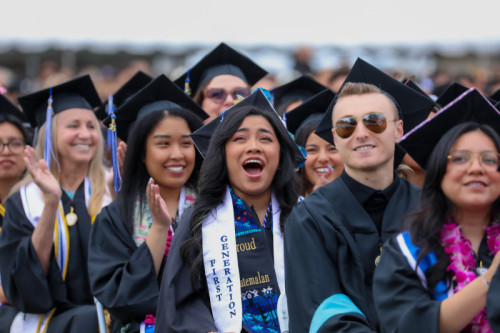
- Grammy-Nominated Music Professor Still Performing and InspiringAfter he stopped touring full-time as a musician several years ago, Aaron Humble increased his pace of sending out feelers to conductors of groups that fly in musicians for a week-long project that often ends in a CD-quality recording. As it often goes, he didn’t hear back from one of the groups he reached out to – True Concord Voices and Orchestra based out of Tucson, Ariz. On a gig months later in Santa Fe, N.M., the Cal State San Marcos associate professor of music was approached by a fellow tenor explaining how a group in Tucson needed another tenor for an upcoming project. Humble booked the trip and enjoyed a week of recording and camaraderie. “The first conversation I had with the conductor was him sort of sheepishly saying, ‘Hey, I’m really sorry that I never responded, but I do really like your audition materials and we’d love to have you sing with the group,' ” said Humble, who is co-chair of the music department and also filling the role of director of the dance studies program. About six years later, a weeklong recording session with True Concord resulted in “A Dream So Bright: Choral Music of Jake Runestad,” which debuted in August 2024 at No. 2 on Billboard’s Classical Albums chart. Three months later, the recording was nominated for a Grammy Award for Best Choral Performance, a realization of a lifelong dream for Humble. True Concord didn't win when the Grammys were held last February. But the experience of recording and, months later, riding the wave of the highest nomination for a recording artist is one that Humble puts high on his list of career accomplishments. And it came with the group that previously had ignored his inquiries. “It’s up there in the top for sure,” said Humble, who has performed at such iconic venues as the Kennedy Center, Lincoln Center and the Library of Congress. “It’s not something you can will to happen because you’re relying on democracy. You’re relying on the members of the (Recording) Academy, the majority of whom I don’t know. And so it does feel like this sort of grassroots recognition of an accomplishment.” In his career as a solo artist, Humble has performed in opera, recital, concert and chamber music venues, enjoying solo appearances with the St. Paul Chamber Orchestra and the Boston Pops. During his tenure singing with Cantus out of Minneapolis, he sang more than 800 concerts and recorded 10 albums with one of the nation’s premier vocal ensembles. CSUSM's School of Arts is making a concerted effort to hire and encourage its faculty to stay active in their respective industries. Ching-Ming Cheng, music co-chair, gives piano concerts both solo and with renowned performers routinely. She just completed a fall series of concerts with cellist Paul Tseng and harpist Vanessa Fountain throughout San Diego County, including on campus and at the California Center for the Arts, Escondido. “Part of it is to feed my artistic soul and sort of keep that fire burning,” Humble said. “Creative activity is part of our scholarship as applied faulty in the arts, so that’s part of it. But in terms of teaching, it also helps me stay relevant. I’m teaching students how to practice, how to perform, and if I stop doing it, I won’t be as good at teaching that.” Originally from northeast Ohio, Humble was the director of choral activities at Minnesota State University, Mankato before coming to CSUSM. A graduate of Millikin University in Illinois, he has a Doctor of Music degree in vocal performance and literature from the Indiana University Jacobs School of Music. Humble and his husband, Xu Zou, have a home in New York primarily for Zou’s work there. Their main residence is in South Park with their two cats, Chopstick and Toothpick. Humble and Cheng are in the process of proposing a music recording and production degree program in the music department. Music technology is currently a minor. “I think that will bring a whole different set of students here as well,” Humble said. “And for the students who are really looking for that ramp into a vocation, into a career, that’s a great degree for them.” His dream is to host a music therapy program at CSUSM. There are no such programs in San Diego, an area rich with the therapeutic power of music. Humble directs the university choir, which is an SATB (soprano, alto, tenor and bass) ensemble that is open to students of all majors and other members of the campus community. The choir does not require an audition. Humble slowly has been building small group opportunities for students who are looking for more advanced repertoire. That’s innovation. For him, it’s about finding the right pace and fit while pushing the students to discover new opportunities within themselves. That’s acceleration and cultivation, the key tenets behind CSUSM’s Blueprint for the Future fundraising campaign, in which the College of Humanities, Arts, Behavioral and Social Sciences lists “Anchoring the Arts” as one of its two initiatives. “I don’t know if we’re quite there yet, but we’re close,” he said. “It’s just nice to give those students who want that extra challenge with harder repertoire, with things that are a little more on the art music side of things and might challenge students in a way that those kids want but other students don’t want. To have space for them to do that.” The concert that the music department is working on this semester is about belonging and unity. Earlier this semester, Humble wasn’t feeling well at choir rehearsal while recovering from getting vaccinated. He ended up having a great rehearsal and left feeling much better. It reminded him that he hears the same from students often. They may arrive to campus in a bad mood but leave their interactions upbeat and ready to go on with their day. Being on the receiving end of that community of care is a gentle reminder that he and other faculty often provide the same. “People need those safe spaces more than ever and those moments of community,” Humble said. “I feel really fortunate that I get to teach in a place that wants that for all of our students. And that I get to make music and build that community in an artistic environment with my students as well.” Media Contact Eric Breier, Interim Assistant Director of Editorial and External Affairs ebreier@csusm.edu | Office: 760-750-7314
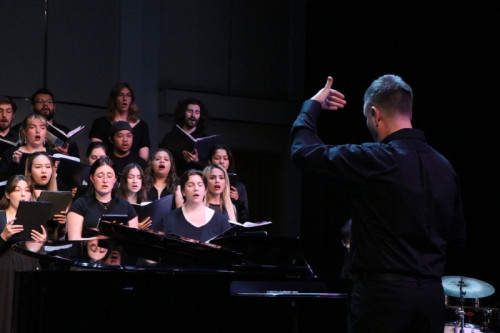
- Construction of New Wellness and Rec Center UnderwayCal State San Marcos held a Construction Kickoff on Nov. 12 to celebrate construction being underway for the Student Wellness and Recreation Center (SWRC), which is expected to open by summer 2027. Approved in a CSUSM student-led referendum last year, the center will be located next to The QUAD housing complex across Barham Drive from University Village Apartments. CSUSM is partnering with Sea Breeze Properties – developers of North City, which includes CSUSM’s North Commons, The QUAD and the Extended Learning Building – on the SWRC, which will be the latest addition to campus life. “This has been a long time coming, and we couldn’t be more proud to be here today,” said Darren Levitt, vice president and partner of Sea Breeze Properties and emcee for the Construction Kickoff. “I don’t know of any other development in the country that includes all of these elements in one project.” The SWRC will have a 10,000-square-foot gym space with strength training equipment and cardio machines, two standard-sized indoor courts and a rooftop deck with a turf field. In addition to the extensive room for student exercise, there will be dedicated wellness areas indoors and outdoors, a commuter lounge and an esports collaboration den. The project also includes additional student housing, with over 900 beds, as well as a central park and retail space. “When students have access to wellness and recreation resources, they thrive, manage stress better, perform stronger academically and feel more connected to their campus,” CSUSM President Ellen Neufeldt said. “That’s what this center is all about.” “When you choose an institution of higher learning as a student, you’re not just choosing a place to learn; you’re choosing a community to live in and live with, and having this very crucial piece of the community be here on campus is going to be an enormous opportunity for our students,” Assemblymember Darshana Patel said. CSUSM’s Campus Recreation students and staff worked hard to advocate for the center. Campus Rec student ambassadors, along with other student groups and organizations, helped make the project a reality by conducting a referendum to ensure that students' voices determined the outcome of the SWRC. “I’ve seen firsthand how much our students have wanted and needed this space,” said Illeana Carmona Chavez, an Associated Students, Inc., leader and former Campus Rec employee who helped lead the student referendum. “Since 2016, students have been advocating for more wellness and recreation opportunities, and we’re making that dream a reality. “This center is about fitness and wellness, but it’s also about belonging. It’s about giving students – especially commuters like me – a place to connect, recharge and feel part of something bigger.” Added San Marcos Mayor Rebecca Jones: “We are very focused on wellness and keeping people healthy, so this could not be more appropriate. San Marcos used to be just known as the educational hub of North County; now we’re known as the health care epicenter. So to have a place like this built makes so much sense.” As CSUSM’s campus continues to grow, buildings like the SWRC are what make all the difference. Providing a space for students to exercise, play sports with friends or simply relax and unwind fosters the sense of community that CSUSM strives for. “This project reflects the power of public and private partnerships – students, faculty, staff, business, government and community coming together to make something extraordinary happen,” Neufeldt said. “Whether students live on campus, commute or call CSUSM home for just part of their day, this center will be their space – a place to recharge, to build friendships and to strengthen mind and body.” Media Contact Eric Breier, Interim Assistant Director of Editorial and External Affairs ebreier@csusm.edu | Office: 760-750-7314

- Women's Basketball Team Opens With WinThe Cal State San Marcos women's basketball team opened the 2025-26 season with a 58-52 victory over Azusa Pacific at The Sports Center on Friday. The Cougars shot 33.3% (20-of-60) from the field and 33.3% (6-of-18) from beyond the arc, while holding APU to 25% from the field and 21.1% from 3-point range. The Cougars also won the rebounding battle 55-41, led by Kaity Haan's game-high 16. Sophie Morales had 15 points, five rebounds and four assists for CSUSM, while teammate Sydney Hani added 16 points and 10 rebounds. The Cougars notched their second win on Saturday, beating visiting Point Loma Nazarene 62-50. CSUSM's next game is Nov. 28 against Northwest Nazarene in the PLNU Thanksgiving Classic. Media Contact Eric Breier, Interim Assistant Director of Editorial and External Affairs ebreier@csusm.edu | Office: 760-750-7314
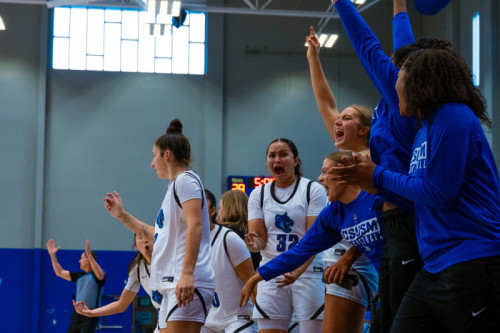
- Grant Helps Expand Interprofessional EducationWhen Tania Chambers was growing up, she often found herself helping her parents navigate new systems, serving as an interpreter, advocate and problem-solver. “From a young age, I helped my family assimilate into our new environment, filling in gaps wherever I was needed as a first-generation Mexican American.” said Chambers, now a Master of Social Work (MSW) student at Cal State San Marcos. “I became their translator, doctor, lawyer and social worker. These experiences shaped why I want to do this work.” She carried that sense of purpose into every role she has served – including preschool teacher, nanny and YMCA educator – and she saw firsthand how communication gaps between parents and schools can affect a child’s success. “That made me want to be part of the solution,” she said. “I want to help families and children feel supported.” Now in graduate school – something that once felt out of reach as the first in her family to attend college – Chambers recently took part in an innovative Interprofessional Education (IPE) event hosted by the CSU Shiley Haynes Institute for Palliative Care, which is part of a larger palliative care initiative funded by the Hearst Foundations. Palliative care brings together a team of health professionals to provide holistic treatment for individuals with serious illnesses. IPE focuses on training students to work together in this collaborative model. Designed by CSUSM faculty from multiple disciplines, CSUSM’s IPE program places students from nursing, kinesiology, speech-language pathology and social work together to analyze a case study and develop a comprehensive plan of care. The goal is to help students think collaboratively while gaining an authentic understanding of what teamwork looks like in real clinical settings. “Graduate school can feel siloed since we focus on our own programs,” Chambers said. “This event brings students from multiple disciplines together under one roof to learn from each other and realize how much stronger we are when we collaborate.” In this year’s exercise, Chambers’ team worked on a family-centered case study involving a medically complex 8-year-old boy living with his grandparents. “These cases remind us that families don’t exist in isolation,” she said. “When a child is struggling, it’s not just on the grandparents or the teacher. There’s a whole network of people who can help. Our job is to strengthen that network.” “Students will be expected to collaborate with other professions when they enter practice,” said Katie Robinson, assistant professor of nursing. “But as with every other practice competency, we have to teach them why, show them how and guide them through practicing it themselves. And now that we've worked out such an effective IPE model, it's exciting to think about expanding across the campus – and beyond.” Since spring 2023, the institute has hosted five immersive IPE days, with participation now reaching 150–200 students across the College of Education, Health and Human Services. “Alumni from previous events have shared how this event helped shape their transition into the workforce,” said Lorene Ibbestson, a social work lecturer. “It gave them confidence in their professional abilities and a deeper appreciation for how collaboration across disciplines can create meaningful change.” Now, thanks to a generous $200,000 grant from the Hearst Foundations, CSUSM’s IPE program will continue to grow, with plans to: launch a new IPE event in spring 2026 focused on health policy, including students from psychology, sociology and political science; build a similar IPE model at Fresno State and ultimately other CSU campuses; explore cross-campus collaborations with UC San Diego medical students and Clinical Pastoral Education programs. For students like Chambers, these simulated experiences are invaluable in helping them prepare for meaningful careers. For CSUSM, the Hearst Foundations’ generous support not only strengthens IPE but also moves the university closer to its “Blueprint for the Future” campaign goal to raise $200 million in philanthropy and research funding. Media Contact Brian Hiro, Communications Specialist bhiro@csusm.edu | Office: 760-750-7306
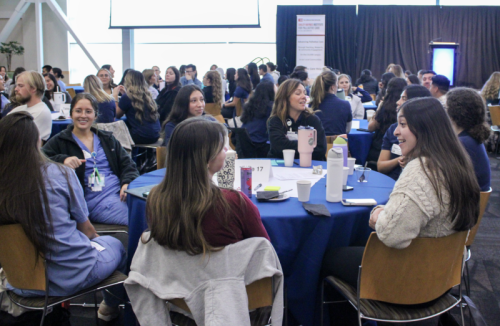
- CSUSM Helping Students Amid CalFresh DisruptionsThe federal government shutdown might soon be ending – a vote in Congress could be held in the coming days – but it’s unclear how long it will take the federal Supplemental Nutrition Assistance Program (SNAP) to return to normal operations. Cal State San Marcos students who receive benefits through CalFresh, California’s version of SNAP, could experience delays in receiving those funds and potential decreases to the amount in November. According to a recent article from the California State University Chancellor’s Office, an estimated total of more than 85,000 students may be impacted by the CalFresh delays. In light of this disruption to students’ basic needs, CSUSM is doing all it can to offer assistance to help fill the gap and keep students on the path to success. “At CSUSM, we understand that when students experience unexpected disruptions, like the recent delays in CalFresh benefits, their ability to remain focused on their academics is impacted,” said Viridiana Diaz, CSUSM's vice president for Student Affairs. "I’m proud that our campus community is responding with care and action through expanded food pantry hours, emergency funding and community food distributions. No student should ever have to worry about where their next meal will come from. Our commitment to the holistic well-being of our students remains a priority." Here is a list of resouces that are available during this time: Emergency Food Distribution Associated Students, Inc., is teaming up with Feeding San Diego to host an emergency drive-through food distribution for the campus as well as the local community. The event will take place Saturday from 10 a.m.-noon in Lot N (next to Parking Structure 1). ASI is seeking students, employees and community members to volunteer to make the distribution happen – setup begins at 8 a.m. and cleanup starts at noon. You can register to volunteer at SignUpGenius. ASI Cougar Pantry The ASI Cougar Pantry serves all CSUSM students to decrease food insecurity on campus. The pantry offers dry and canned goods, produce, milk, toiletries and diapers – free of charge. Location: University Commons 104 Hours: Monday-Thursday, 10 a.m.-5 p.m. (extended hours from Nov. 12-19 and open until 6 p.m. on Tuesdays and Wednesdays) Email: cougarpantry@csusm.edu Each currently enrolled CSUSM student can shop once per week for free groceries. ASI Fresh Market Monday Biweekly food distribution of free fruits and vegetables for CSUSM students thanks to generous partner Feeding San Diego. Don't forget to bring your student ID and a reusable bag. Location: Cesar Chavez Plaza Hours: 11 a.m.-1 p.m., first and third Monday of the month Upcoming dates: Nov. 17, Dec. 1 ASI Cougar Pantry On-the-Go Additional snacks and produce are available in 10 locations across campus: ACE Scholars Services office (Administrative Building 3400) ASI office (University Student Union 3700) Clarke Field House COMPASS Center (Kellogg Library 1103) EOP/TRIO (Admin Building 4100) Kellogg Library (second floor) Social and Behavioral Sciences Building (first floor) STEM Success Center (Extended Learning Building, Room 251) Student Health & Counseling Services Building (lobby) Veterans Center Swipe Out Hunger The Swipe Out Hunger program provides up to 10 well-balanced, on-campus meals per semester to students experiencing food insecurity and/or an emergency. Eligible students can dine at Campus Way Cafe or Kalamata Mediterranean Hilltop Grille (limited lunch menu) in the USU. ASI Student Emergency Fund The ASI Student Emergency Fund provides $350 to currently enrolled CSUSM students who encounter an unexpected financial emergency or catastrophic event in which their basic needs and/or ability to function as a student are impacted. San Diego Food Bank The San Diego Food Bank offers a wide variety of food and non-food related programs designed to help San Diegans in need. Feeding San Diego Feeding San Diego offers food assistance at sites throughout San Diego County. Use the “Find Help" map to search for free food distributions near you by entering your zip code. 211 San Diego 211 San Diego offers real-time updates on food distribution schedules, eligibility and local resources. Visit the website or dial 2-1-1 for immediate support. If you need help navigating available options, reach out to the Cougar Care Network at ccn@csusm.edu or visit www.csusm.edu/ccn. Media Contact Brian Hiro, Communications Specialist bhiro@csusm.edu | Office: 760-750-7306
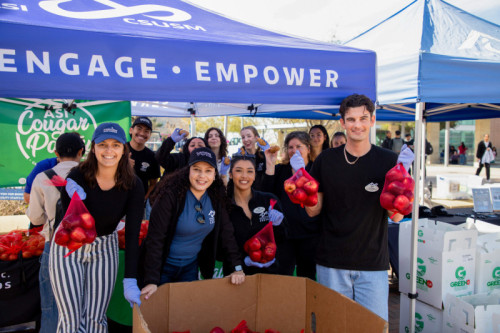
- Media Studies Student Co-Produces Stories for PBS ProgramSitting in her homeroom class during her first year at Westview High School, Roury Fitzpatrick was captivated by the morning newscast produced by her school. She hadn't watched the news much growing up, but it was then that she decided she wanted to pursue broadcast journalism. Fitzpatrick, a second-year media studies student at Cal State San Marcos, has had a passion for writing ever since she was young, creating short stories and pretending she was a New York Times bestselling author. When she became interested in broadcast journalism in high school, she convinced her parents to let her change her elective and she joined Westview's broadcasting class. Her passion instantly ignited. As a high school sophomore, she learned about PBS News Student Reporting Labs (SRL). Fitzpatrick and a few of her classmates helped produce a podcast segment for SRL about teen mental health and high schoolers’ plans after graduating. This inspired Fitzpatrick to create her own podcast. By her junior year, she and her classmates had created their high school’s first podcast, “Wolverine Pause.” It was there that Fitzpatrick interviewed many people, including Fox 5 San Diego weather anchor and reporter Megan Healy. Fitzpatrick has enjoyed every aspect of her journey in broadcast journalism, from conducting interviews to filming, editing and being behind the scenes. She loved the experience as an anchor for her school’s newscast but thought that it was too scripted at times. Fitzpatrick prefers to take a more authentic route, reporting on the scene or searching out individuals to interview in their fields rather than reading off a teleprompter. “I really love interviewing people because that’s when you get that one-on-one connection and you learn the most about them,” Fitzpatrick said. “But I also do like being behind the camera and editing because I feel that's when you see the magic of it all coming together.” After working with SRL on the podcast segment and experiencing the support and mentorship from members of PBS as a high school student, Fitzpatrick decided to apply for PBS News' College Climate Reporting Fellows program as she was preparing to attend CSUSM. After a highly competitive application process in which she had to create a pitch on a climate issue, Fitzpatrick was one of 10 students across the nation selected for the program, joining students from schools including Cornell, Penn and USC. Fitzpatrick co-produced two stories focused on climate issues. The first story came during the SRL’s summer academy trip to Washington, D.C., where she had the opportunity to meet PBS News reporters, ask questions and gather advice about broadcast journalism. The story Fitzpatrick worked on was about Vihaan Mathur, then a 19-year-old climate activist attending UC Berkeley. The story focused on his work combating climate issues, donating to local schools and writing a children’s book about climate change. Fitzpatrick and her team came up with interview questions and shared editing responsibilities. When it was time for filming, Fitzpatrick conducted the interview and recorded the voiceover. Sharing roles with her teammates allowed Fitzpatrick to experience every aspect of creating and producing a news story. The second story was more hands-on. Fitzpatrick was assigned to a group with other SRL members to come up with another story on environmental issues. Her team focused on the language barrier between Spanish and English speakers, and how this makes discussing climate issues more difficult. Highlighting a USC newsletter called “Sustainability Sin Fronteras,” which aims to inform Los Angeles’ Spanish-speaking communities about climate issues, Fitzpatrick’s group interviewed the newsletter’s co-founder, Mayte Abrica. They also interviewed Miguel Ordeñana, the senior manager of community science at the Natural History Museum, which works to bring climate education to L.A. residents. Fitzpatrick and her group spent three days in L.A., brainstorming interview questions, dividing work duties and filming through pouring rain to piece together their story. “There was a lot of rain, we were cold, we were wet, and we had to protect these very nice cameras as we hiked through muddy trails,” Fitzpatrick said. “We were just happy we got through it. It was such a great experience.” Working with SRL and co-producing stories has provided Fitzpatrick with much knowledge and experience as she continues on her journey pursuing broadcast journalism. She loves exploring new topics of research and enjoys the connections she forms with the people she interviews. In the future, she hopes to continue her work with PBS or branch out to other news outlets focused on making change. “I want to tell stories about important issues like war, politics or underrepresented communities,” Fitzpatrick said. “I want to tell stories that have substance to them, stories that matter, where people will turn on the news and feel they need to listen.” Media Contact Eric Breier, Interim Assistant Director of Editorial and External Affairs ebreier@csusm.edu | Office: 760-750-7314
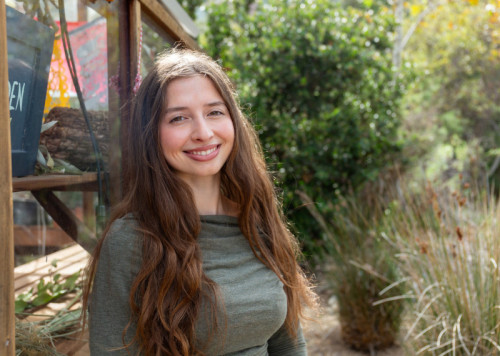
- Founding Faculty Brooks and Marion Reid Champion Student SuccessAs a student-athlete competing in cross country and track and field, Renton McGregor spends most of the year practicing and competing. “On top of training up to three hours a day, my major in algorithmic mathematics is very demanding and leaves little time to hold a job,” McGregor said. “I’m grateful for Brooks and Marion Reid’s support and hope to pay it forward someday, especially in math or athletics.” McGregor's appreciation of the Reids comes from being the recipient of both the Reid Athletic Scholarship and the K. Brooks and Marion Reid Student Achievement Award in Discrete Mathematics. These scholarships are just two of the many ways that the Reids have contributed to Cal State San Marcos over the years. Founding faculty members Brooks and Marion Reid have been champions of student success since CSUSM’s earliest days. Brooks, a mathematics professor emeritus, and Marion, the university’s founding dean of Kellogg Library and now dean emerita, have contributed to initiatives across campus, from academics and research to athletics. Brooks serves on the College of Science, Technology, Engineering, and Mathematics (CSTEM) Advisory Council, staying connected to students like McGregor. "It was exciting to be part of CSUSM from the very beginning,” the Reids said. “The library and mathematics have always been close to our hearts, and we’re proud of how the university has flourished over the years. We had fulfilling careers here, and giving back is a way to honor that legacy and help future generations thrive.” In addition to scholarships and mathematics awards, the couple supports the annual Reid Lecture Series, which invites the campus and local community to experience the beauty of mathematics through continued support for programs like the Mathematical Association of America Institutional Membership, the Putnam Mathematics Competition and the San Marcos Informal Mathematics Colloquium. Thanks to the generosity of donors like Brooks and Marion Reid, CSUSM students have the resources to thrive both academically and personally. Their gifts also contribute to the university’s $200 million “Blueprint for the Future” campaign. Media Contact Eric Breier, Interim Assistant Director of Editorial and External Affairs ebreier@csusm.edu | Office: 760-750-7314
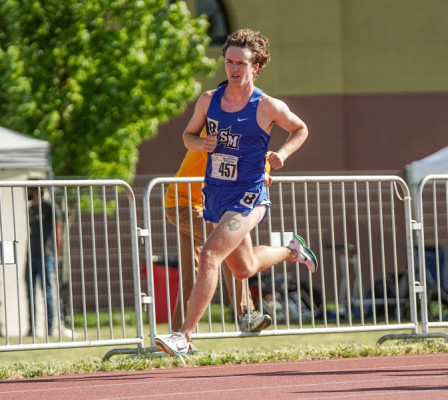
- How One Student Transformed Challenges Into ChangeWhen Sol Haro first attended Cal State San Marcos, he felt isolated. Not because of the school – Haro was an active student and involved in campus clubs – but because of a struggle with his identity. As a Mexican American child of a single parent from a low-income household, he felt a level of pressure to find a place where he thought he belonged. This pressure was amplified by Haro’s identity as a transgender man. He felt alone on campus – othered – because he rarely saw his identity reflected around him. “I didn’t see myself in my peers or professors,” Haro said. “I always tell people I’m a triple threat because I’m brown, I came from poverty and I’m trans. A lot of things have happened in my life, so it's hard to find people who relate to me without disclosing all those things.” Haro graduated last spring with a degree in social sciences, and he now works on campus as a basic needs assistant for the Cougar Care Network. The impact of his work on campus earned him the President’s Student Champion Award for Inclusive Excellence and Diversity this year, and he was honored as the winner at the All Peoples Luncheon on Oct. 23. “Every human being has a right to basic needs, and we should not have to suffer to acquire them,” Haro said during his acceptance speech. By his senior year at CSUSM, Haro realized that what was blocking him from connecting with others was the internal shame he carried as a transgender man. With that in mind, he not only began working on self-acceptance but also sought to be a representation of transgender people in higher education that he longed to see. Last academic year, Haro learned about an opening for a civic engagement ambassador through Service Learning and Civic Engagement. He was drawn in by the office’s advocacy and decided to apply. In his application, he stated that while he is committed to neutrality, his passion is in helping those from underrepresented communities. Soon after becoming an ambassador, Haro began creating a comprehensive and easy-to-understand CalFresh guide for CSUSM students. After going through the challenging and confusing process of applying for CalFresh as a transgender man, Haro used inspiration from his mother to help motivate him to push for a change. “My mom was like, ‘If you don’t like something, then do something about it. No one’s gonna do it for you,’ ” Haro said. The guide is a tool to help all students, but it also highlights issues that transgender students seeking basic needs might encounter, such as what to do when their preferred name doesn’t match their legal name. This was not only a way for Haro to help other students on campus, but also a tool for self-empowerment. “I wanted to create this guide for every student, because getting basic needs is what you deserve. It shouldn’t be so difficult,” Haro said. While his guide focuses on the experiences of transgender, undocumented and mixed-status students, it is for everyone, and Haro encourages all students to apply for CalFresh. “More than half of our students probably qualify for CalFresh, and they’re not doing it because they either don’t know what it is or they have some shame around it,” Haro said. “But if you need that help, there’s no shame in receiving it. You don’t need to suffer for your basic needs.” Breaking the stigma around public assistance programs like CalFresh was also one of Haro’s goals with the CalFresh guide. He saw the shame his mother felt in using programs like CalFresh, Section 8 and Medi-Cal. That shame was amplified by how people reacted when his mom pulled out her benefits card at the grocery store. He said he doesn’t want to see other people struggle the way his mother did just to fulfill their basic needs. “Your physical health, your mental health, food impacts both of those,” he said. “Statistics show that when you have a lack of basic needs, you’re not showing up to class and your grades are dropping. How are you supposed to thrive in school and get your degree if all you’re thinking about is how hungry you are?” Haro has found that seeking assistance can be empowering rather than bringing shame. Creating the guide wasn’t easy. The CalFresh application contains technical language that can be hard for some to interpret. It required cross-referencing documents, taking notes while completing his own application and interviews, and spending hours on research. Every conversation Haro had with a CalFresh representative during this process became a valuable tool to help students. “I wanted the guide to be empowering for people,” Haro said. “Yes, the process is difficult, but once you get the benefits, it’s totally worth it.” Along with the CalFresh guide, Haro has also collaborated with various university departments and student organizations to raise awareness about social justice, voting rights and public policy issues. In 2024, he won the Innovation Hub’s Social Innovation Challenge for his proposal to redesign CSUSM’s commuter hub into a lounge focused on students’ comfort and basic needs. Last year, Haro also contributed artwork that centered on transgender joy and the normalization of transgender identities on campus. The picture, which is on display in the University Student Union, features Haro shirtless, three months after his top surgery. Haro described being open about his transness as “so incredibly scary but so empowering” and “filled with self-love.” As Haro continues his work with the Cougar Care Network, he’s thinking beyond the campus community. What began as a way to navigate his own challenges is now opening doors for others, a step toward lasting change built on lived experience and compassion. “This is representation,” Haro said. “I’m happy, I’m thriving and I’m filled with joy because of who I am.” Media Contact Eric Breier, Interim Assistant Director of Editorial and External Affairs ebreier@csusm.edu | Office: 760-750-7314
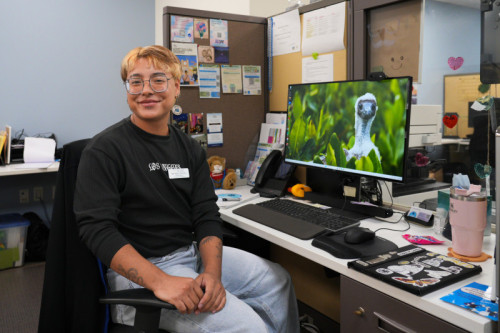
- 'Accidental Archivist' Helps Mexican Communities Learn Their HistoryFernando Amador likes to call himself an accidental archivist. Long before he was an assistant professor of history at Cal State San Marcos, Amador was a doctoral student at New York’s Stony Brook University who was doing field work for his dissertation in Mexico. Hoping to comb through the historical archive of the people of Temacapulin, a small town northeast of Guadalajara, he was surprised to learn that they didn’t have one. What they had was thousands of documents piled haphazardly into boxes, all too vulnerable to environmental damage in the event of, say, a flood. Helping to organize the town’s historical record wasn’t part of Amador’s dissertation, but his conscience wouldn’t allow him to return to New York with the papers in such disarray. So he gave himself a crash course in archival studies – which traditionally is more the domain of librarians – and, with the aid of some volunteers from the community, he led an effort in 2022 to whip the archive into shape. During the three months that Amador was in Temacapulin, word of his project spread to neighboring towns. It just so happened that the Indigenous community of San Juan de la Laguna (La Laguna for short) was in the midst of an effort to organize its own historical documents. The people behind it invited Amador to town, and he discovered that this project involved almost twice as many documents (nearly 20,000), stretching back more than a century earlier, to the late 1600s. “When I saw that this project was a different beast compared to the first one,” Amador said, “I knew we needed more resources and more help.” After a hiatus of a few years – during which he finished his dissertation, earned his Ph.D. from Stony Brook and was hired by CSUSM – Amador finally found himself in position to revisit the La Laguna archive. Last spring, he received a $15,000 grant from the Endangered Archives Programme of the British Library, the largest library in the world and the home of such storied pieces as the original Magna Carta. Over the summer, Amador spent two weeks in La Laguna, and the funding not only paid for his trip, but allowed him to purchase laptops and hire and train five members of the community as full-time workers on the 10-week project. “I never imagined I’d end up in this field, but it truly offers incredible opportunities,” he said. “I get to meet new people and develop skills in an area where, surprisingly, historians often know nothing about – archives. You’d think that’s odd, like chemists not learning about the equipment in their own labs. Now that I’m doing this work, I realize just how striking that gap is between what historians do and the archival side of their profession.” Amador streamlined and accelerated a process that had progressed in fits and starts since his initial visit to La Laguna three years earlier. In helping gather the materials, he found that many of them were stored in unfavorable conditions, such as sacks, cardboard boxes and bound together with string. Many also were marked with water stains. As the group surveyed and created an inventory of the documents, they encountered samples both mundane (countless tax receipts) and captivating. One example was a paper record of a legal battle in the early 20th century between a town resident and an immigrant from Lebanon. “How did a man from Lebanon end up in this little town?” Amador said. “That whole story sounds fascinating. Discovering history through these documents is, in a way, truly thrilling.” Beyond just the work itself, the biggest challenge that Amador faced was gaining the trust of an Indigenous community that traditionally has had a fraught relationship with the local government and the outside world at large. “With me coming from the United States, people wondered, ‘What are his priorities? Why is he here helping us? What’s in it for him?’ ” he said. “It really came down to open communication – reassuring them that I’m doing this because I love the work and involving them in the process as much as possible.” As the grant-funded initiative wraps up this fall, Amador is considering a return to La Laguna in January to review the finished product in person. And as the domino effect continues, the second project might lead to a third one. Another nearby Indigenous community heard about the work Amador led in La Laguna and requested his support for its archival project, which features more digitized material instead of old, yellowing papers. For that one, which remains in the preliminary stages, he is coordinating with classically trained archivists, namely Sean Visintainer and Jennifer Ho of the CSUSM University Library. He’s also talking with Visintainer and Ho about the possibility of introducing and teaching a history course in archival studies. “I really did stumble into this type of work. I still am even hesitant to call myself an archivist,” Amador said. “I'm learning so much, and there's still so much for me to learn. But it does seem like this is where my career is headed – bringing archival studies and history together in some way.” Media Contact Brian Hiro, Communications Specialist bhiro@csusm.edu | Office: 760-750-7306
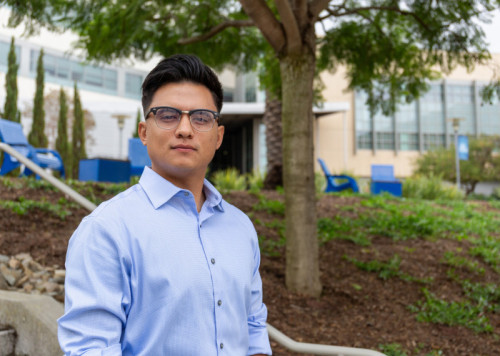
- Kinesiology Student's Inspiring Journey from Foster Care to GraduationSometimes even the smallest things can be taken for granted. Many students never have had to worry about affording a meal or squeezing in hours of sleep between their work and school schedules, but that’s not the case for Alexus Foster. Alexus was in and out of the foster care system from the time she was 2 years old. She has lived in countless states and attended 17 different schools. However, with the help of Cal State San Marcos’ ACE Scholars Services program, she is graduating this winter with a bachelor’s degree in kinesiology and a minor in dance. “ACE has had a really big impact on me,” Alexus said, “and for that I'm very grateful.” Alexus always knew she wanted to pursue higher education because she believed it would help her avoid the challenges that her mother faced. Pregnant at 15 years old, Alexus’ mother struggled to raise a child. After her mom was kicked out of Alexus’ grandmother’s house, Alexus was sent to New York to live with her great-grandfather. Her mother booked a return flight to California, and Alexus’ childhood was on a new course. Growing up, Alexus experienced the hardships of persistent custody battles and court-mandated counseling therapy. She was constantly moving among different households and family members. Alexus is 29 years old and the oldest of six siblings (the youngest is 15). She was 16 when her siblings entered the foster care system for the first time. She hoped to shield them from the reality of foster care. But Alexus and her siblings were apart for almost a year, which was one of the hardest times of her life. Alexus and her siblings have always had a strong bond, celebrating every holiday together at their grandparents’ house as children. “I love my siblings, and I just want to be the best big sister they could have. If they ever need anything, they can call me,” Alexus said. As complicated as Alexus’ life was, additional struggles began to arise when she became an adult. After she moved out of her mom’s house at 19, trying to complete her degree while managing two jobs to afford her rent became a strenuous task. Alexus was attending Riverside Community College when she learned about ACE Scholars Services. It’s a program that would soon change her life for the better. ACE Scholars Services helps former foster youth pursue higher education by providing services and support systems. ACE knows that helping foster youth earn a degree provides them with the tools and self-determination they need to succeed in life. That has been the case for Alexus. Alexus worked the overnight shift at the Ontario airport, ending her shift at 7 a.m., then driving from Rancho Cucamonga for her hour-plus commute to campus. When she hadn’t slept all night, ACE provided her a space to get rest during the day. When she didn’t have enough money to afford food or school supplies, ACE was there. When her car broke down, ACE was there. In October 2024, Alexus lost her job and was evicted, marking the start of a difficult time. But ACE was once again there to help. “The support that I get from ACE, everything that I've been able to get through in my life is because ACE has always helped me, especially Leigh,” Alexus said. Leigh Quijada has been the director of ACE Scholars Services for the last two years after previously working with the program for 13 years as a counselor. She has played a huge role in Alexus’ life by not only guiding her but helping her get through every obstacle she has faced. “Persistent” and “resilient” are the two words Quijada uses to describe Alexus. “I think Alexus might be the only student I’ve had who has been through it all and overcome everything," Quijada said. Quijada has been there for Alexus since the start of her journey at CSUSM and has watched her grow. When Alexus was put on academic probation last year because she had to prioritize going to work to pay her bills over attending class, Quijada did everything in her power to help Alexus get re-enrolled. “She is probably one of the biggest people in my life,” Alexus said. “I wouldn’t be getting my bachelor's without Leigh; she’s definitely my rock.” After the difficult years Alexus endured as a foster child, she is graduating this winter and moving to Texas to begin a master’s program in kinesiology. She has played sports since she was young and hopes to continue her love for that field as an athletic trainer for professional athletes. “People don't know what I've been through to get to this point,” Alexus said. “It's going to be a very big accomplishment.” Media Contact Eric Breier, Interim Assistant Director of Editorial and External Affairs ebreier@csusm.edu | Office: 760-750-7314
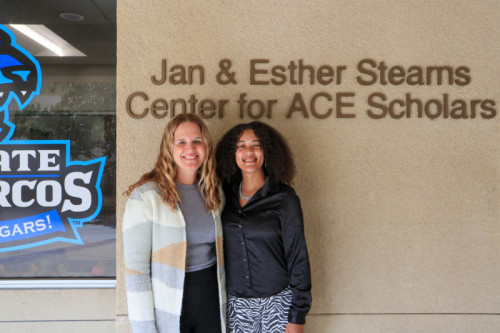
Load more...
Loading...


